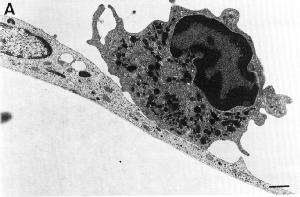| 2002 |

|
YEAR BOOK |
Health Research Board & University College Dublin
|
Cellular intelligence? –
decision-making neutrophils
|

Previous studies have demonstrated that neutrophils can migrate from the bloodstream by two pathways, one of which appears to be specific for the lung. The existence of a migratory route that targets the lung offers considerable potential to develop therapies aimed at reducing neutrophil-mediated lung injury without undermining natural host defences in other tissues.
Using a well-characterised in vitro model system developed by Dr Jill Mackarel, the UCD group has found that it is the neutrophil that 'decides' which migratory route to take to the lung, and not the endothelial cell (lining the blood vessels) as was previously thought. They have also demonstrated that the key molecular elements that determine which pathway is used are among those that are differentially regulated during neutrophil activation. The group is currently investigating this differential regulation using gene-chip technology, which evaluates the expression of 12,000 genes in a single sample. The information obtained will help to identify specific targets for modifying neutrophil migration to the lung in inflammatory diseases.
This work was generously supported by the Health Research Board.
Contact: Dr Clare O'Connor,
Department of Medicine and Therapeutics, The Conway Institute of Biomolecular and Biomedical Research and Dublin Molecular Medical Centre, University College Dublin, Belfield, Dublin 4;
Tel: 01-7162055; Fax; 01-7161136;
E-mail: [email protected]